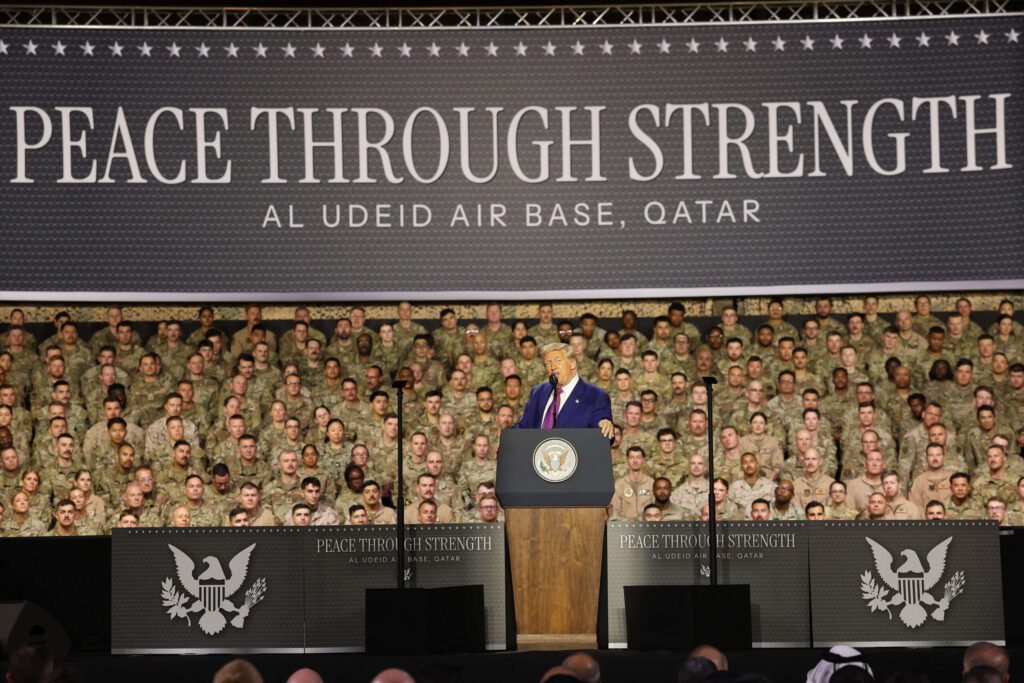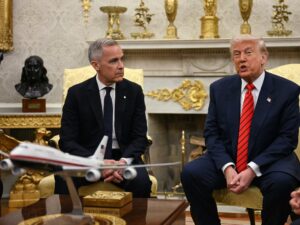
In a dramatic escalation of tensions, the United States conducted military strikes on three Iranian nuclear facilities on June 21, a move announced by former President Donald Trump on Truth Social. The strikes, targeting sites at Fordow, Natanz, and Isfahan, have been framed by Trump and Israeli Prime Minister Benjamin Netanyahu as a demonstration of “peace through strength.” However, critics argue that this is a thinly veiled attempt at domination rather than a genuine pursuit of peace.
Netanyahu’s address following the strikes was marked by a triumphant tone, emphasizing strength as the precursor to peace.
“President Trump and I often say peace through strength,” Netanyahu proclaimed. “First comes strength, then comes peace. And tonight, President Trump and the United States acted with a lot of strength.”
Yet, this rhetoric obscures the reality of an unprovoked war of aggression, with the U.S. aligning with Israel in a campaign that many view as sheer domination.
Historical Context and Ongoing Tensions
The strikes on Iran are the latest chapter in a long history of U.S. and Israeli actions aimed at curbing Iran’s influence in the region. For decades, both nations have propagated the narrative of a nuclear threat from Iran, despite evidence to the contrary. Iran’s civilian nuclear program has been consistently mischaracterized as a weapons program, a claim debunked by U.S. intelligence assessments as recently as March.
This narrative serves to distract from the nuclear arsenals of the U.S. and Israel. The U.S. possesses over 5,000 nuclear warheads, second only to Russia, while Israel, the Middle East’s sole nuclear power, has an estimated 90 weapons. Notably, Israel has never signed the Treaty on the Non-Proliferation of Nuclear Weapons, nor has its nuclear program been subjected to International Atomic Energy Agency (IAEA) inspections.
The Immediate Aftermath and Humanitarian Impact
The June 21 strikes have had immediate and severe repercussions. Panic over potential radiation spread gripped areas near the targeted facilities, compounding the anxiety from ongoing Israeli strikes across Iran. Human rights organizations report at least 865 casualties as a result of these attacks, which have targeted residential areas, media outlets, and critical infrastructure.
For Iranians, the past ten days have been a harrowing ordeal. Trump’s demand for the evacuation of Tehran, a city home to 17 million people, has only heightened the chaos. Meanwhile, Iranian Americans face the distressing reality of their tax dollars funding the destruction of their homeland.
Long-Standing Hostilities and Strategic Interests
The U.S.’s adversarial stance towards Iran dates back to the 1979 Iranian Revolution, which saw the overthrow of the U.S.-backed Shah. Since then, the U.S. has employed a range of tactics to undermine Iran, from economic sanctions to military interventions. The current conflict echoes past U.S. actions, such as its support for Iraq during the Iran-Iraq War and the 1953 coup that reinstated the Shah.
This latest military engagement is not an isolated incident but part of a broader strategy to maintain regional dominance. The U.S. and Israel’s actions are seen as attempts to reshape the Middle East to align with their interests, often at the expense of international norms and laws.
Global Reactions and Future Implications
The international community’s response to the U.S. and Israeli actions has been mixed. Some European leaders have echoed the narrative of a nuclear threat from Iran, while others have expressed concern over the escalation of violence. German Chancellor Friedrich Merz notably praised Israel’s actions, highlighting the growing normalization of state aggression.
The implications of this conflict are profound. It underscores a shift towards a world order where military might is increasingly used to achieve political ends, often bypassing diplomatic channels. The situation calls for a robust antiwar movement and a reevaluation of international accountability mechanisms to prevent further escalation.
As the world watches, the need for a coordinated global response becomes ever more urgent. The challenge lies not only in addressing the immediate humanitarian crisis but also in confronting the broader geopolitical dynamics that fuel such conflicts.






